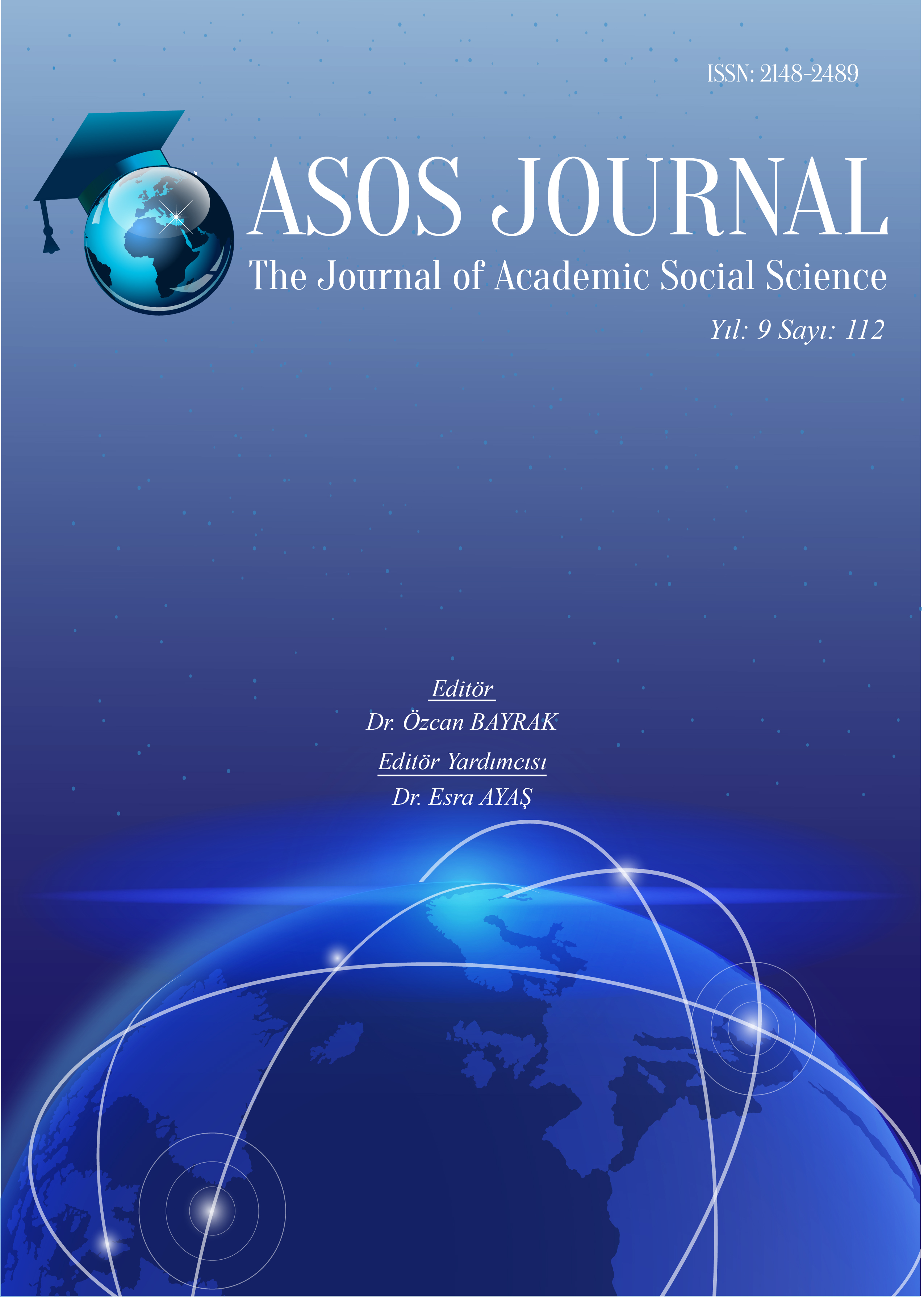Author :
Abstract
Köyden kente göç, 1950’lerden günümüze Türkiye toplumunun gündemindeki en önemli olgulardan ve sorunlardan biridir. Kent kültürüne ve yaşamına entegre olamama, asimilasyon, geleneksel değerlerin çözülmesi, ekonomik problemler ve ötekileştirme gibi birtakım sorunları beraberinde getiren köyden kente göç olgusu, 1960’lı yıllardan beri Türk sinemasının da en önemli temalarından biridir. Bu çalışmada, çözümlemesi yapılan Ahu Öztürk’ün 2015 yılı yapımı Toz Bezi filmi de iç göç olgusunu ve beraberinde getirdiği toplumsal sorunları konu almaktadır. Bu çalışmanın amacı, hayatta kalabilmek adına orta-üst sınıfın evine temizliğe giden Kürt kökenli iki kadının yaşamını beyazperdeye taşıyan Toz Bezi filmini çözümlemek ve bu realitenin toplumsal zihniyet üzerindeki yerini saptamaktır.
Keywords
Abstract
Migration from the countryside to the city, from the 1950s to the present day, is one of the important facts and issues on the agenda of Turkey's society. Rural-to-urban migration, which brings with it some problems such as not being able to integrate into urban culture and life, assimilation, dissolution of traditional values, economic problems and marginalization, is one of the most important themes of Turkish cinema since the 1960s. Dust Cloth (2015) by Ahu Öztürk which analyzed in this study is also about the phenomenon of internal migration and the problems it brings. The aim of this study is to analyze the film Dust Cloth, which reflects the lives of two women with Kurdish origin, who clean the homes that belongs to the middle-upper class in order to survive, and to determine the place of this reality on the social mentality.
Keywords
- Abisel, Nilgün, (1994), Türk Sineması Üzerine Yazılar, İmge Kitabevi Yayınları, Ankara.
- Abisel, Nilgün, (1994), Türk Sineması Üzerine Yazılar, İmge Kitabevi Yayınları, Ankara.
- Adanır, Oğuz, (2012), İlkel Toplumdan Melodram Evrenine, Hayalperest Yayınevi, İstanbul. Akad, Lütfi Ömer, Diyet, (1974), Yön., Lütfi Ömer Akad, Yap., Hürrem Erman.
- Akad, Lütfi Ömer, Düğün, (1973), Yön., Lütfi Ömer Akad, Yap., Hürrem Erman.Akad, Lütfi Ömer, Gelin, (1973), Yön., Lütfi Ömer Akad, Yap., Hürrem Erman.Akbulut, Hasan, (2008), Kadına Melodram Yakışır, Bağlam Yayıncılık, İstanbul.
- Akmeşe, Eşref (2020), “Ötekilerin Cehenneminde Kendi Cennetini Kurmanın İmkansızlığı:Teslimiyet”, (Ed. Zuhal Akmeşe), Türk Sinemasına Özgül Bakışlar: Kültür Tarih Gelenek, Doruk Yayınları, İstanbul.
- Ceylan, Nuri Bilge, Uzak, (2002), Yön., Nuri Bilge Ceylan, Yap., Nuri Bilge Ceylan.
- Çavdar, Tevfik, (2013), Türkiye’nin Demokrasi Tarihi, İmge Kitabevi Yayınları, Ankara.
- Dönmez-Colin, Gönül, (2006), Kadın, İslam ve Sinema (Çev., Deniz Koç), Agora Kitaplığı, İstanbul.
- Engels, Friedrich, (1971), Ailenin, Özel Mülkiyetin ve Devletin Kökeni (Çev., Kenan Somer), Sol Yayınları, Ankara.
- Erman, Tahire, (2004), “Gecekondu Çalışmalarında ’Öteki’ Olarak Gecekondulu Kurguları”, European Journal of Turkish Studies, S. 1.
- Evren, Burçak, (1990), Türk Sinemasında Yeni Konumlar, Broy Yayınevi, İstanbul.
- Gören, Şeref; Tünaş, Erdoğan, Firar, (1984), Yön., Şerif Gören, Yap., Selim Soydan.Gurbetoğlu, Ali, (2008), Bilimsel Araştırma Yöntemleri,http://agurbetoglu.com/bilimselarastirma.html adresinden 31 Aralık 2020 tarihinde erişilmiştir.
- Güçhan, Gülseren, (1992), Toplumsal Değişme ve Türk Sineması, İmge Kitabevi Yayınları, Ankara.
- Güney, Yılmaz, Sürü, (1979), Yön., Zeki Ökten, Yap., Yılmaz Güney.
- Gürbilek, Nurdan, (2001), Vitrinde Yaşamak, Metis Yayıncılık, İstanbul.
- İmançer, D.; Gürses, İ.; Güreş, E.; (2010), “Türk Sinemasında Kadın Yönetmenler AçısındanKadının Temsili Yeşim Ustaoğlu ve Pandora'nın Kutusu”, Akdeniz Üniversitesi İletişim Fakültesi Dergisi, S. 13, s. 181-210.
- Kabadayı, Lale, (2013), Film Eleştirisi, Ayrıntı Yayınları, İstanbul.
- Kaya, Erol, (2017), Kentleşme ve Kentlileşme, İşaret Yayınları, İstanbul.
- Kavur, Ömer; Özakman, Turgut, Yatık Emine (1974), Yön., Ömer Kavur, Yap., Necdet Barlık, Duran Tantekin.
- Kemal, Orhan; Refiğ, Halit, Gurbet Kuşları, (1964), Yön., Halit Refiğ, Yap., Recep Ekicigil.
- Kıray, Mübeccel, (1982), Toplumbilim Yazıları, Gazi Üniversitesi İktisadi ve İdari Bilimler Fakültesi Yayınları, Ankara.
- Makal, Oğuz, (1987), Sinemada Yedinci Adam: Türk Sinemasında İç ve Dış Göç Olayı, Ege Yayıncılık, İzmir.
- Okçuoğlu, Bahar, A., (2019), “Türkiye’de Çerkes Diasporası: Kimlik İnşası ve Referansları”, Sosyoloji Araştırmaları Dergisi, Y. 22, S.1, s. 122-156.
- Önal, Safa; Şasa, Ayşe, Ah Güzel İstanbul, (1966), Yön., Atıf Yılmaz, Yap., Nusret İkbal. Önal, Safa, Vesikalı Yarim, (1968), Yön., Lütfi Ömer Akad, Yap., Şeref Gür.
- Özer, Muammer, Bir Avuç Cennet, (1985), Yön., Muammer Özer, Yap., Kadri Yurdatap, Muammer Özer, Sabahattin Çetin.
- Özgentürk, Işıl, At, (1982), Yön., Ali Özgentürk, Yap., S. Erol Şenyüz.
- Öztürk, Ahu, Toz Bezi, (2015), Yön., Ahu Öztürk, Yap., Çiğdem Mater, Nesra Gürbüz.
- Sağıroğlu, Duygu, Bitmeyen Yol, (1965), Yön., Duygu Sağıroğlu, Yap., Muhtar Kocataş. Sencer, Yakut, (1979), Türkiye’de Kentleşme, Kültür Bakanlığı Yayınları, Ankara.
- Şahin, Osman; Engin Erdoğan; Çankaya, Özden, Kurbağalar, (1985), Yön., Şerif Gören, Yap., Selim Soydan.
- Tolan, Barlas, (1977), Büyük Kent Sorunlarına Toplu Bir Bakış, Ankara İktisadi ve Ticari İlimler Akademisi Yayınları, Ankara.
- Turgul, Yavuz, Sultan, (1978), Yön., Kartal Tibet, Yap., Ertem Eğilmez.Turgul, Yavuz, Züğürt Ağa, (1985), Yön., Nesli Çölgeçen, Yap., Kadri Yurdatap.
- Yerlikaya, Burcu, (2020), “1980 Sonrası Türk Sineması’nda Kadın Temsilleri ve CinsiyetçiSöylencenin Reddi: Mine Nasıl Kurtulur?”, Gaziantep Üniversitesi Sosyal Bilimler Dergisi, Y. 19, S. 3, s. 1286-1303.
- Yıldız, Engin, (2008), Gecekondu Sineması, Hayalet Kitap Yayıncılık, İstanbul.
- Yılmaz, Atıf; Deveci, Sadık; Kavur, Ömer, Mine, (1982), Yön., Atıf Yılmaz, Yap., Atıf Yılmaz. Yüce, İhsan, Kibar Feyzo, (1978), Yön., Atıf Yılmaz, Yap., Nahit Ataman, Ertem Eğilmez.
- Zürcher, Erik Jan, (2000), Modernleşen Türkiye’nin Tarihi, (Çev., Yasemin Saner Gönen), İletişim Yayınları, İstanbul.
